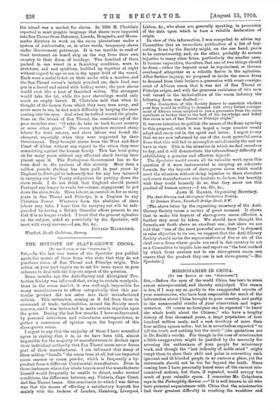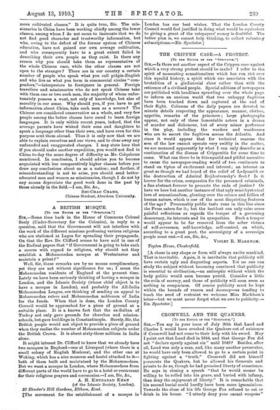MISSIONARIES IN CHINA.
[To ram EDITOR OF TH2 " SPIICTAZOR."1 SIE.,—Before the eyes of the world China has been to some extent misrepresented, and thereby misjudged. The reason is due, if I may say so, partly to the exaggerated reports of your missionaries, who have been responsible for much of the information about China brought to your country, and partly to the unsuccessful results of your observation and repre- sentation. Of course no foreigner can be expected "to know the whole truth about the Chinese," who have a lengthy history of four thousand years, a large population of four hundred million souls, and a vast territory of more than four million square miles; but he is nevertheless expected "to tell the truth and nothing but the truth" (the quotations are in Dr. Smith's words). For though in the case of missionaries a little exaggeration might be justified by the necessity for arousing the enthusiasm of your people for missionary work, and though the "last infirmity of noble mind" might tempt them to show their skill and pains in converting such ignorant and ill-blooded people in so curious a place, yet the statements should not be too far beyond the truth. Since coming here I have personally heard some of the current mis- conceived notions, but these, if repeated, would occupy too much of your valuable space. I remember Mr. Colqaboun says in the Fortnightly Review :--a It is well known to all who have personal acquaintance with China that the missionaries find their greatest difficulty in reaching the wealthier and
more cultivated classes." It is quite true, Sir. The mis- sionaries in China have been working chiefly among the lower classes, among whom I do not mean to insinuate that we do not find good character and trustworthy information, but who, owing to the defect of the former system of Chinese education, have not gained our own average cultivation, and who consequently have to a great extent failed in describing their own people as they exist. Is there any reason why you should take them as representative of the whole Chinese race, while the other classes are not open to the stranger ? There are in our country a certain number of people who speak what you call pidgin-English and who live as what you term in commercial circles " com- pradors,"—interpreters to foreigners in general. Foreign travellers and missionaries who do not speak Chinese take with them one or two such men, the majority of whom unfor- tunately possess a want, not only of knowledge, but also of morality in our sense. Why should you, if you have to get • information about China, take such men as a source ? The Chinese are considered conservative as a whole, and very few people among the better classes have cared to learn foreign languages. It is only within recent years, indeed, that the average parents have wished their sons and daughters to speak a language other than their own, and have even for this purpose sent them abroad. Thus it is only now that we are able to explain ourselves and our views, and to clear away any unfounded and exaggerated charges. I may state here that if you should make another expedition, you would not find in China to-day the same degree of difficulty as Mr. Colquhoun mentioned. In conclusion, I should advise you to become acquainted with 'our comparatively higher classes before you draw any conclusions about us as a nation; and further, if misunderstanding is not to arise, you should send better- educated men and women as missionaries, though I do not by any means depreciate the good work done in the past by those already in the field.—I am, Sir, &c.,
SRI-CHAO CHANG,
Chinese Student, Aberdeen University.







































 Previous page
Previous page